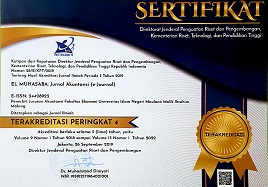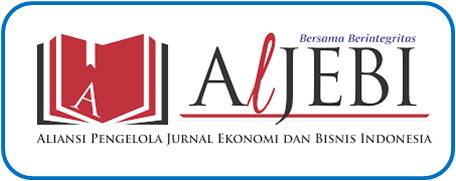Corporate Spiritual Responsibility (CSpR): Kontruksi Model CSR berdasarkan Surat Al-Mudassir dan Kitab Tarbiyah Wa Tahdzib
Abstract
Method: This research uses a postmodernist-interpretivist paradigm where the research tries to integrate the meaning of each data obtained through interviews and construct a Corporate Social Responsibility (CSR) model based on Surah Al Mudassir and the Kitab of Tarbiyah Wa Tahdzib.
Results: Empirically in Islamic boarding schools, it was found that 1) The application of Corporate Social Responsibility (CSR) towards profits is interpreted as sustenance that arises from a sense of sufficiency and gratitude, 2) The application of Corporate Social Responsibility (CSR) towards people is interpreted as charity service. 3) The implementation of corporate social responsibility (CSR) for the planet is interpreted as mutual concern and responsibility.
Implications: this study provides implications for accounting science, especially the concept of CSR in a broader context
Novelty: This study focuses on the construction of a CSR model that integrates organizational culture, religion and spirituality into a CSR model based on Surah Al Mudassir and Kitab Tarbiyah Wa Tahdzib
Keywords
Full Text:
PDFReferences
Benitez, J., Ruiz, L., Castillo, A., & Llorens, J. (2020). How corporate social responsibility activities influence employer reputation: The role of social media capability. Decision Support Systems, 129, 113223. https://doi.org/10.1016/j.dss.2019.113223
Christensen, H. B., Hail, L., & Leuz, C. (2021). Mandatory CSR and sustainability reporting: economic analysis and literature review. Review of Accounting Studies, 26(3), 1176–1248. https://doi.org/10.1007/s11142-021-09609-5
Driana Leniwati et al. (2022). Local community values based University Social Responsibility (USR): In Indonesia context. Isu Sosial Dan Politik Pembagunan, 4(1), 88–100.
Du, S., & Xie, C. (2021). Paradoxes of artificial intelligence in consumer markets: Ethical challenges and opportunities. Journal of Business Research, 129(February 2019), 961–974. https://doi.org/10.1016/j.jbusres.2020.08.024
Fordham, AE, & R. G. (2018). Map ping Arti Tanggung Jawab Sosial Perusahaan - Sebuah Studi Kasus Australia. Jurnal Internasional Tanggung Jawab Sosial, 1(3), 1–20.
Forés, B., & Fernández-Yáñez, J. M. (2023). Sustainability performance in firms located in a science and technology park: the influence of knowledge sources and absorptive capacity. Journal of Knowledge Management, 27(11), 112–135. https://doi.org/10.1108/JKM-11-2022-0883
Han, H. (2021). Consumer behavior and environmental sustainability in tourism and hospitality: a review of theories, concepts, and latest research. Journal of Sustainable Tourism, 29(7), 1021–1042. https://doi.org/10.1080/09669582.2021.1903019
Long, B. S. (2022). CSR and reconciliation with Indigenous peoples in Canada. Critical Perspectives on International Business, 18(1), 15–30. https://doi.org/10.1108/cpoib-12-2017-0096
Loviscek, V. (2021). Triple Bottom Line toward a Holistic Framework for Sustainability: A Systematic Review. Revista de Administracao Contemporanea, 25(3 Special Issue), 1–11. https://doi.org/10.1590/1982-7849rac2021200017.en
Negari, A. K., Sukoharsono, E. G., & Djamhuri, A. (2022). Mengajukan Spiritualitas Sebagai Jiwa Corporate Sosial Akuntansi Tanggung Jawab. Jurnal Akuntansi Multiparadigma, 13(2), 226–241. https://doi.org/10.21776/ub.jamal.2022.13.2.17
Pahlev, R. W. (2018). Pelaksanaan Perusahaan Spiritual Dalam Penerapan Prinsip Good Corporate Governance Di Kelompok Taman Batik Terang Bulan Togyakarta. Jurnal Kompetensi Bisnis, 2, 124–141.
Rosyid, A., Kunaifi, A., & Asyari, Q. (2021). Corporate Spiritual Leadership: Model Kepemimpinan Bisnis Era Milenial dalam Menciptakan Great Corporate. Transparansi : Jurnal Ilmiah Ilmu Administrasi, 4(1), 85–93. https://doi.org/10.31334/transparansi.v4i1.1609
S. Zhang. (2020). Spiritualitas Tempat Kerja dan Perilaku Pro-Organisasi yang Tidak Etis: Pengaruh Media Terhadap Kepuasan Kerjan. Jurnal Etika Bisnis, 161(3), 687–705.
Shahzad, M., Qu, Y., Javed, S. A., Zafar, A. U., & Rehman, S. U. (2020). Relation of environment sustainability to CSR and green innovation: A case of Pakistani manufacturing industry. Journal of Cleaner Production, 253, 119938. https://doi.org/10.1016/j.jclepro.2019.119938
Shayganmehr, M., Kumar, A., Garza-Reyes, J. A., & Moktadir, M. A. (2021). Industry 4.0 enablers for a cleaner production and circular economy within the context of business ethics: A study in a developing country. Journal of Cleaner Production, 281, 125280. https://doi.org/10.1016/j.jclepro.2020.125280
Umam, M. R. K., & Auliya, Z. F. (2018). Hubungan Kausalitas Workplace Spirituality Dan Kinerja Karyawan: Perspektif Mediasi Etika Kerja Islam. BISNIS : Jurnal Bisnis Dan Manajemen Islam, 5(1), 23. https://doi.org/10.21043/bisnis.v5i1.2946
DOI: https://doi.org/10.18860/em.v15i1.23786
Refbacks
- There are currently no refbacks.
Editorial Office:
Megawati Soekarnoputri Building
Accounting Department, Faculty of Economics
Jln. Gajayana 50 Telp (0341) 558881
E-mail: elmuhasaba@uin-malang.ac.id
Universitas Islam Negeri Maulana Malik Ibrahim Malang
E-ISSN 2442-8922
P-ISSN 2086-1249

This work is licensed under a CC BY SA 4.0 International License

















